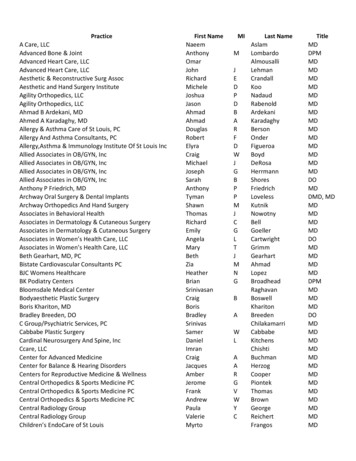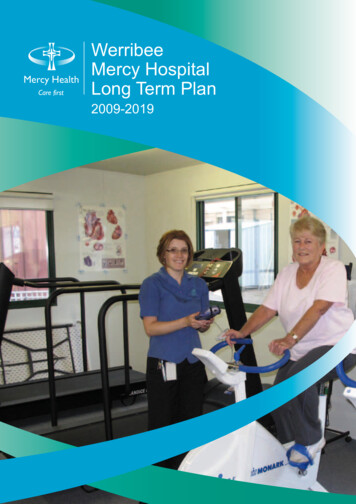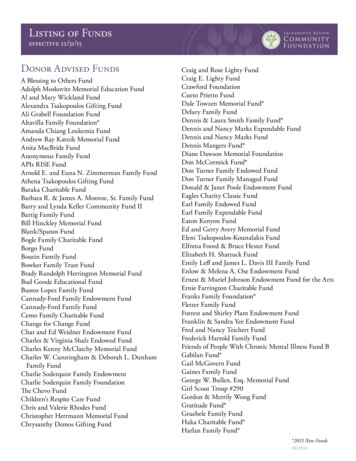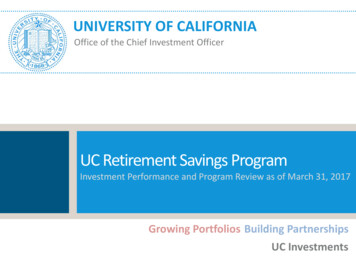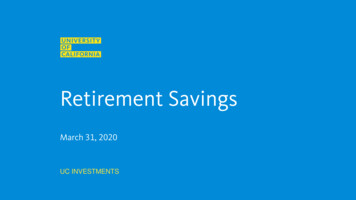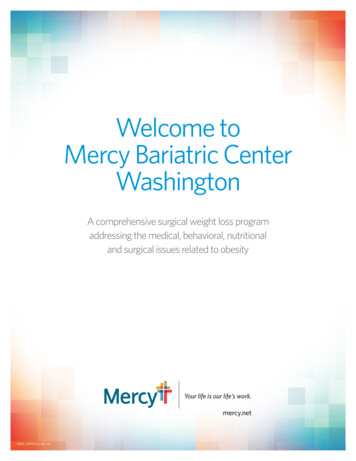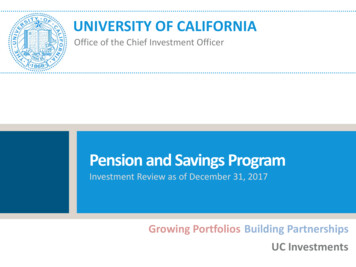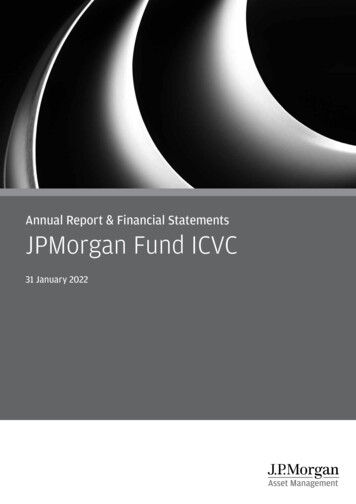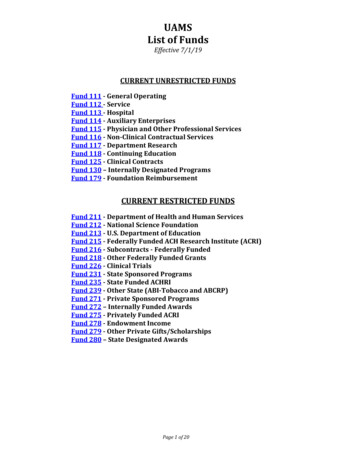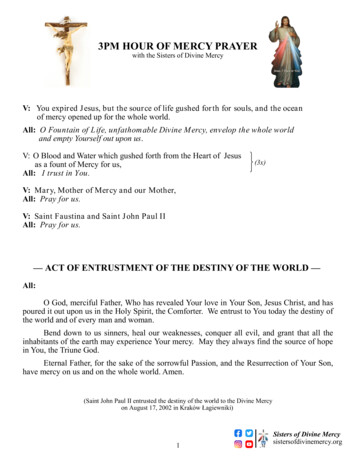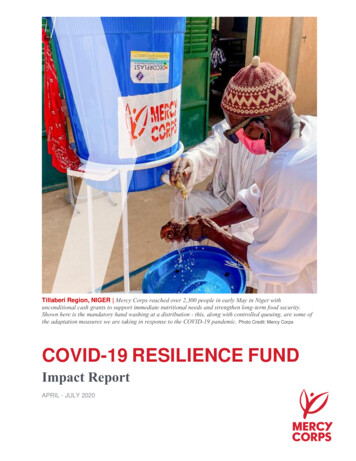
Transcription
Tillaberi Region, NIGER Mercy Corps reached over 2,300 people in early May in Niger withunconditional cash grants to support immediate nutritional needs and strengthen long-term food security.Shown here is the mandatory hand washing at a distribution - this, along with controlled queuing, are some ofthe adaptation measures we are taking in response to the COVID-19 pandemic. Photo Credit: Mercy CorpsCOVID-19 RESILIENCE FUNDImpact ReportAPRIL - JULY 2020
OverviewIt has been just over four months since the World Health Organization (WHO) declared COVID-19 aglobal pandemic. Mercy Corps continues to move our global mission forward - working to meet theneeds of the people we serve, while drawing on over 40 years of experience in humanitarian work.COVID-19 is a global emergency without borders, without treatment; an unforgiving virus exposingcracks in our support systems and imploring all of us to take action to reach those who are mostvulnerable.The harsh reality is that COVID-19 is just one of many disruptive elements our teams and the peoplewe serve are facing. In these complex contexts, COVID-19 places additional challenges onvulnerable populations already facing conflict, displacement, poverty and limited access to essentialservices.Your contribution to Mercy Corps’ COVID-19 Resilience Fund has allowed for our quickprogrammatic pivot to address the immediate and long-term impact of COVID-19, enable innovation,and support critical contextual analysis informing our strategy and implementation. This flexiblefunding has enabled us to leverage our experience as a community of 6,000 global humanitariansto address an unprecedented pandemic, putting our skills and nimble action to the test as we mounta global response.1 Mercy Corps’ COVID-19 response strategy is focused on three key programareas designed to address both short- and long-term impacts of this crisis: protecting health;meeting the urgent needs of families; and economic resilience and recovery. Our strategy isrooted in robust analytics, so we can act quickly on the evolving impacts of this crisis.Staff and participant safety is our first priority. We have held global health and safety webinars forstaff so they can adapt programs quickly and safely, and rolled out guidance and analytics across avariety of sectors to help both Mercy Corps and other organizations learn from each other andimplement creative approaches to tackling the myriad of challenges posed by COVID-19.To date, Mercy Corps’ COVID-19 Resilience Fund has raised 33 million dollars tosupport these efforts from generous donors like you.2 Around the world, our teamshave adapted and launched programming to help prevent the spread of COVID-19,provided critical supplies and information to those most vulnerable to the virus, andexpanded services to address the economic fallout from shutdowns - reaching morethan 10 million people across dozens of countries. Over 94 percent of our programscontinue to implement while adapting to the changing context, and we have launched nearly50 new programs designed to address the impacts of COVID-19. Your support hascontributed to Mercy Corps’ global response to COVID-19. Together, we are coming togetherto save lives and reach those most in need. Thank you.Mercy Corps’ global response includes on-going programs that have pivoted and adapted to COVID-19,as well as newly-launched programming.2 Mercy Corps’ COVID-19 Resilience Fund includes contributions from private individuals; corporationsand foundations including Cisco Systems, Starbucks, Shell, and Margaret A. Cargill Philanthropies; andinstitutional donors including USAID and DFID.1MERCY CORPSCOVID-19 Resilience Fund Report: July 20202
ContextThe COVID-19 crisis is affecting our world in several dimensions. It is having direct, immediateeffects – on health, food security and economies. It is having more indirect effects – in the responseof governments, and on trends in demographics and migration. Finally, it is having ‘illumination’effects – revealing and highlighting things that were already there, casting a new light on issues ofinequality, vulnerability and power.To better understand the impacts of COVID-19, Mercy Corps has built on our expertise in crisisanalytics to provide real-time information and recommendations for impactful and context-drivensolutions that will minimize the toll of the COVID-19 pandemic on vulnerable individuals. Through ourfield-driven analysis of the secondary impacts of COVID-19, we are highlighting emerging trends,informed by regional and country-specific data, together with a specific focus on economic impacts.We have shared our secondaryimpact and markets analysisthroughout the humanitariancommunity, including with the USSenate Foreign Relations Committee,the US Agency for InternationalDevelopment (USAID), the UK Departmentfor International Development (DFID), andthe Swedish International DevelopmentCooperation Agency (SIDA). Mercy Corps isquickly becoming the go-to informationsource on secondary impacts of COVID19 for policymakers and institutionalThis map combines data from Mercy Corps sources with informationdonors around the world.available through John Hopkins University and Our World in Data.Here are a few examples of secondary impacts we are tracking and using to inform our response:Misinformation: Political actors – both governments and non-state groups – are seeking tomanipulate reality with their approach to knowledge and information, particularly social media. Thisincludes the ‘weaponization’ of pandemic narratives against marginalized groups. In DRC, Haiti, andNigeria (among other places), rumors persist that COVID-19 does not exist and is a tool forpoliticians or a way to make money.Conflict: COVID-19 has the potential to impact pre-existing conflicts in dangerous ways –exacerbating tensions, fueling unrest, disabling peace operations and disrupting humanitarian aid.While in some places the crisis may open the possibility of greater peace and cooperation, in othersit is expected to fuel conflicts, with unscrupulous leaders exploiting tensions for their own advantage.Skyrocketing poverty: We are likely to see the first rise in poverty since 1990, erasing the lastdecades of gains in poverty reduction globally. Between 71 and 100 million people could be pushedinto extreme poverty as a result of this crisis. New estimates indicate that the number of foodinsecure could increase to 270 million before the end 2020 - an 82 percent increase from before theCOVID-19 pandemic.MERCY CORPSCOVID-19 Resilience Fund Report: July 20203
Market destabilization: The negative economic impacts caused by COVID-19 are among the mostwidespread and durable of the pandemic. The closure of international borders, disruption of flightsand supply chains, and export bans restrict the ability of many countries to procure personalprotective equipment, diagnostics, and essential food items, risking disease spread and heighteningthe risk of hunger and famine. Small businesses, entrepreneurs and people working in the informallabor market are much more likely to be negatively impacted, but the ripple effects are felt by all with the potential to exacerbate inequality in many already fragile contexts.Below, we are pleased to share an update on our impact to date in our three key program areassince Mercy Corps’ global COVID-19 Resilience Fund started at the end of March 2020.IMPACT HIGHLIGHTInformation Services to 7.6 MillionThe COVID-19 and Desert Locusts interlocking crises threatensmallholder farmers' health, livelihoods and food security inEast Africa. Mercy Corps' AgriFin program, acting as acatalyst, rapidly brought together a wide array of partners toquickly deploy farmer-friendly digital tools and originalcontent via SMS, WhatsApp, social media and radio supporting public health messaging and a productiverecovery for food systems.For example, via a new WhatsApp line, farmer communitiescan easily report desert locusts in their areas and access upto-date information. Penn State is receiving all of the datareported in via the WhatsApp line and using it to informresearch and provide weekly country level maps so thatKenyan farmers know the locusts’ latest locations. AndShamba Shape-Up, a content delivery partner, isreaching 5 million rural people with COVID-19The images above show the mobileinformation in a talk show format featuringphone interface for smallholderexperts and bespoke video content that can alsofarmers for accessing informationbe shared through social media.from the locust call center. Fromthe WhatsApp menu, people canlink out to Covid-19 messaginghosted by the World HealthOrganization.MERCY CORPSCOVID-19 Resilience Fund Report: July 20204
Protecting HealthMercy Corps’ immediate-term COVID-19 public health response has focused on increasing safeaccess to potable water, soap, hand-washing stations, and sharing critical information about hygieneand social distancing practices. We are also tackling misinformation and supporting social andbehavioral change, by using technology to scale reliable health messaging campaigns (includingsocial media, radio, and messaging apps). Our COVID-19 response is focused on vulnerablepopulations: people with pre-existing health conditions, disabilities, those self-quarantiningor ill due to COVID-19, those living in settings where basic services are traditionally lacking(refugee/internally displaced persons camps, urban slums), and those uniquely vulnerabledue to their culture, age, gender, ethnicity, and socio-economic status.Water, Sanitation & HygieneOur experience helping communities cope with Ebola and tuberculosis has taught us how to provideessential services in water, sanitation and health during an outbreak. We pair these services withaccurate and culturally-appropriate information about disease prevention. Because people who aremost vulnerable to COVID-19 are those weakened by disease or age, we are taking measures toensure they are also protected from waterborne and other hygiene-related diseases.In Pakistan, where the healthcaresystem was already facing severechallenges, we have expanded andadapted our tuberculosis preventionprogram to include COVID-19prevention, particularly in Sindh andPunjab, working in close collaborationwith government agencies. We aresupporting 10 primary healthcarefacilities and 3,000 households withwater and sanitation services andinfection prevention, comprehensivemessaging around COVID-19, andsupporting continuity of essentialhealthcare services through telemedicineand helplines. We have developedguidelines for hospitals and providedPPE to medical providers, and aredistributing cash to the hardest hit, mostvulnerable households.MERCY CORPSWith Pakistan’s ongoing lockdown in response to COVID-19,one of Mercy Corps’ primary concerns is the continuation ofits country-wide tuberculosis programming. After consultationwith the government, partners and Mercy Corps teammembers, program participants in remote areas are beginningto receive medicine for the next two months they wouldotherwise not have access to due to the lockdown.COVID-19 Resilience Fund Report: July 2020Photo Credit: Mercy Corps5
In Uganda, Mercy Corps is distributing 10,000jerry cans, soap and hand-washing stations tovulnerable communities and health facilities inKaramoja, North East Uganda. We areorganizing radio spots with Ministry of Healthapproved messages, have distributed crucialmaterials related to maternal and child healthduring COVID-19, and expedited therehabilitation of 50 boreholes to ensurewater scarce communities can access water.This work will reach 310,000 people.Above, getting ready to distribute the 10,000 jerry cans inKaramoja, North East Uganda. Photo Credit: Mercy CorpsIn Colombia, COVID-19 hit right as the coffeeharvest began. To date we have sent mobilemessaging with COVID-19 prevention tips tomore than 3,600 coffee farmers and aredelivering 1,500 hygiene kits. Mercy Corps alsolaunched a radio campaign on COVID-19prevention reaching listeners in 22 municipalitiesin Cauca, Colombia.Similarly in Guatemala, we have distributed1,200 food baskets and hygiene kits to coffeegrowing communities in Huehuetenango, andplan to distribute 1,200 N95 masks for a localhealth authority. The kits are complemented bya text message campaign and radio spots.COVID-19 intervention in Cauca, where coffee growingfamilies received information and hygiene kits.Photo Credit: Mercy CorpsProviding Accurate InformationAccurate information is critical to prevent the spread of COVID-19, and even more important inplaces dealing with conflict, violence and weak governance. We are closely tracking how and whatinformation is reaching vulnerable populations, and have been concerned about the evidence ofmisinformation and rumors circulating in many places around the world.MERCY CORPSCOVID-19 Resilience Fund Report: July 20206
Image translation: “Do you need the rightinformation about Coronavirus? Call LAVE at*533 (Digicel) or leave a missed call at 509.2814.0163 (Digicel or Natcom) *All callsare free, my dear. We’re waiting for your call!”In Haiti, there has been significant misinformation,rumors and fear around the pandemic, leading toviolence towards those with COVID-19 as well astreatment centers. Mercy Corps, in partnership withViamo, a mobile services global social enterprise,and the Haitian Ministry of Health, is leading a groupof international and local organizations conducting amass public campaign to raise awareness ofCOVID-19 and help prevent its spread. Thesuccessful campaign uses a traditional storytellingtechnique unique to Haiti, and the messages aredelivered by popular public personalities. Thecontent also includes interactive ‘gamified’scenarios, rumor quizzes, and children’s lessonsdesigned to minimize fear. Within the first week oflaunching an information hotline, nearly 2,500unique listeners called in, accessing 30,000 keypieces of information.Since we launched the program in May, Mercy Corps has reached2.2 million people in Haiti with COVID-19 prevention information.In Nigeria, there is a common belief thatCOVID-19 does not exist, and that it is adeliberate act by developed nations to reducethe world’s population. With Nigeria still in theearly stages of the pandemic, now is a criticaltime to be reaching people with accurate andtrustworthy information, while also monitoringpolitical tensions and violent conflict. MercyCorps has been working in Nigeria for manyyears, and we moved quickly to adapt toCOVID-19 across six states - disseminatingIn Kano State, Nigeria Mercy Corps hosts the weekly radioaccurate information via SMS, radioprogram Wake Daya (“one bean” in Hausa, symbolizingbroadcasts and talk shows, and social mediatogetherness). The program promotes peaceful coexistencethrough a variety of means. In response to reports of risingabout the virus and how to report cases togender-basedviolence, hosts discussions about the COVIDthe appropriate authorities. In conflict-ridden19lockdown,which has limited movement and drasticallyYobe state, we are implementing a programaltered life at home. Pictured L-R: Aisha Muhammad Yakasai,that aims to build the resilience of 30,000Deputy Superintendent of Nigeria’s Security & Civil Defense Corps,Nura Muktar Umar & Sani Isyaku Daneji, Community Peacehouseholds to deal with shocks and stressesObserver-Interfaith Mediation Centre. Photo Credit: Mercy Corpsof challenges including conflict, climatechange and now COVID-19. We are nowtraining members who are part of Community Resilience Groups to carry out door-to-doorawareness campaigns in their respective communities, along with building new handwashingstations. Mercy Corps is doing similar information dissemination work across Africa, inconflict-affected communities in Kenya, Tanzania, Uganda, Mali, and Ethiopia.MERCY CORPSCOVID-19 Resilience Fund Report: July 20207
In India, we have reached 98,000 people with COVID-19 prevention messaging, focusing onworkers at tea estates. We have used simple approaches appropriate for the context - in the case oftea estates in India, this has meant blasting messaging from trucks that circulate among the estates.The messaging is paired with distribution of key hygiene materials. An added challenge in India isthe monsoon rains and flooding, which have affected more than 1.3 million people across India todate this year.Reaching Refugees and Internally Displaced PeopleRefugees are particularly vulnerable to COVID-19, due tocrowded living conditions and lack of adequate sanitation. InSyria, where prolonged conflict has displaced millions, we aredistributing hygiene kits, setting up additional water tanks,improving wastewater treatment and working with peer agenciesto promote hygiene awareness. With the first case of COVID-19recently confirmed in Idlib province, we must act quickly toprevent massive spread among people living in close quarters.We are conducting awareness sessions about COVID-19 focusing onhand washing in North West Syria, and WASH volunteers aredistributing flyers and posters and answering questions.Photo Credit: Mercy CorpsAcross Iraq, Mercy Corps is doing hygiene promotion andhygiene kit distribution in 10 internally displaced camps,reaching 19,000 households. Our teams are going tent totent to ensure the messages around COVID-19 preventionand hygiene materials are being delivered to the mostvulnerable residents. Photo Credit: Mercy CorpsMERCY CORPSIn Iraq, Mercy Corps is working in some ofthe most conflict-affected areas of thecountry where COVID-19 is spiking. In Salahal-Din, community action committees quicklylaunched a multi-channel public campaignaround hygiene and cleaning that reached20,000 people, and constructed a temporaryquarantine center serving 1,500 patients,that will eventually convert to a primaryhealthcare center serving 20,000 people. Weare also supporting the rehabilitation of awater treatment plant that will benefit 20,000people in Tikrit.COVID-19 Resilience Fund Report: July 20208
Going Beyond the ExpectedIn times of crisis, Mercy Corps goesbeyond the expected - our teams arethinking outside of the box andovercoming obstacles. In Timor-Leste,our resourceful team pivoted a plasticsrecycling program to transform25,000 plastic water bottles into 30 handwashing stations for community membersto prevent the spread of COVID-19.As part of our strategy in Timor-Leste, a household package was designedto promote key behaviors that can prevent COVID-19 transmission. Ruralhouseholds received a benefits of soap sticker, how to make a tippy tapflyer, and a pictorial physical distancing poster. Bars of soap and ropewere used to increase household level tippy tap creation. A flipbook toengage communities around awareness about the virus, its symptoms, andbehaviors to avoid and to adopt was also disseminated.Photo Credit: Mercy CorpsIn Tunisia, where hospitals are understaffed and lack sufficient supplies in the best of times, MercyCorps, in partnership with the KhirKhmir Association, launched an initiative to use a 3D printer tomake reusable plastic visors for personal protective equipment (PPE) for local health care workers,police officers and the National Guard.Left: Young people working on PPE prototypes in the EcoHub Entrepreneurship Center run by the KhirKhmirassociation in Tunisia. Right: A Tunisian innovator and entrepreneur modeling the prototype mask.Photo Credit: Mercy CorpsMERCY CORPSCOVID-19 Resilience Fund Report: July 20209
Meeting Urgent Needs and SupportingResilient FamiliesGetting Cash into the Hands of the Most VulnerableMercy Corps is supporting peoples’ urgent needs through cash transfers and financial inclusionresources that sustain economic well-being, food security, nutrition and livelihoods while alsostimulating the local economy. Transfers have also been found to improve the capacity of recipientsto adhere to distancing measures and stay-at-home orders, limiting the spread of COVID-19. Overthe last decade, Mercy Corps has become a leader in cash programming, connecting individuals in31 countries to cash in times of crisis. We are adapting our cash approach to COVID-19, building inflexibility, increasing the use of digital transfers, and scaling up responses to help families meet theirurgent needs.In Colombia, Mercy Corps leads VenEsperanza, a large emergency cash consortium reachingVenezuelan migrants and refugees (and vulnerable Colombians) with resources to support access tocritical basic needs, including housing, food security, and health. With the onset of COVID-19 in theregion and strict quarantine measures in place throughout the country, we added an emergencycomponent providing two months' worth of assistance for the most vulnerable and those at risk ofeviction, including a digital top up in March and April for those already in the program. We haveexpanded our use of e-transfers via mobile phones for contactless delivery wherever possible. Mostof the people we serve are completely unable to work due to quarantine restrictions and the cashtransfers provide a critical lifeline to ensure households comply with social distancing measures andhave continued access to housing. This program is reaching nearly 90,000 people in majortransit and settlement cities, as well as areas along the Venezuelan border. This includesmore than 18,000 new people reached in May alone, combined with distributing 4,800 hygiene kits.Tainne Urdaneta, a 44-year oldteacher and nurse with twodaughters, ages 9 & 15, made thearduous journey from Venezuelato Colombia in search of a betterlife for her family. Along the waythey were robbed and losteverything, eventually living on thestreets for a time. Through theVenEsperanza program, Urdaneta wasable to pay rent for a place to live andstart a small food business. Now withCOVID-19, she was forced to send herA program participant and staff member during a VenEsperanzadaughters away to stay at a non-profitCOVID-compliant distribution. Photo Credit: Mercy Corpshousing youth so that they would havefood to eat. Her business has been impacted - she can either risk a fine and virus exposure if she works,or have no income. The future looks uncertain, and the cash from Mercy Corps is what is keeping herafloat to meet her most basic needs.MERCY CORPSCOVID-19 Resilience Fund Report: July 202010
In Kenya and Uganda, people living in urban areas dependent on the informal economy have beenhardest-hit by the pandemic’s accompanying lockdown. As movement restrictions are imposed,prices increase, and temporary employment and coping mechanisms that are typically available dryup. Launched in July, Mercy Corps is delivering electronic cash vouchers to up to 5,000 vulnerablehouseholds, benefiting up to 25,000 individuals, in Nairobi and Kampala. The vouchers allowfamilies to purchase food and enable the local informal markets to remain open.IMPACT HIGHLIGHTAn Integrated Approach to Disaster ManagementOver the last five years, Puerto Rico has been battered by drought, hurricanes,earthquakes, and now COVID-19 - all disasters that disproportionately affect themost marginalized communities and economic sectors. With a poverty rate topping43% pre-COVID-19, the small island economy had already lost 5% of its GDP byApril 2020 due to COVID-19 lockdown measures. Mercy Corps has been working inPuerto Rico since Hurricane Maria in 2017, helping people recover and rebuild withan eye towards long-term resilience. We are building on this experience: providingurgently needed produce food baskets to families and helping small-scalefarmers better integrate into local markets. We are supporting local organizationsto launch localized messaging campaigns to raise awareness and limit thespread of the virus, and providing tailored technical support and cash transfersto small businesses to adapt and survive. In close partnership with local communityorganizations, we are committed to supporting vulnerable Puerto Ricans throughthe multiple challenges that lie ahead, and helping them to build back stronger for abrighter future.Cash Transfers to Fisherfolk:Mercy Corps is providing direct assistance tosmall businesses and fisherfolk to recovertheir livelihoods via cash transfers andtailored technical support to ensure financialviability.“This crisis is comparable to[Hurricane] Maria. Although this timewe have not lost equipment, we don’thave anyone to sell our products todue to distancing measures andrestaurants being closed.” -GerardoMorales, a fisherman in Maunabo, a coastalmunicipality in eastern Puerto Rico.MERCY CORPSCOVID-19 Resilience Fund Report: July 2020Photo Credit: Mercy Corps11
Economic Resilience and RecoveryThe geographic reach and severity of this crisis continues to evolve rapidly, and our current analysisand experience from recent outbreaks paints a picture of the likely impacts of the COVID-19pandemic on market systems. Hit hardest economically will be those who operate in the informaleconomy, rely on informal credit, or depend on fragile markets to meet their needs, including youngpeople and women. Estimates are that the number of people living on less than 1.90 or 2.00 perday will increase by 71-100 million due to COVID-193, and 2020 will mark the first time this centurywhere there are more people living in extreme poverty than in the previous year.While government measures, and the impact they have on businesses and people, vary from onecountry to the next and from one day to the next, we use careful analysis to inform our economicrecovery programming. Since the onset of COVID-19, we have completed eight market analysisstudies around the economic and other secondary impacts of COVID-19, including a Global RapidMarket Impact Report - so we know which markets are affected, the specific challenges people facein accessing food and supplies, and how those in the informal economy have been impacted byshut-downs. These analytics enable us to move quickly, effectively mobilize where most needed,and pivot and adapt our programming to meet these challenges.Our economic resilience and recoverystrategy is built on Mercy Corps’ longstanding ‘markets in crisis’ approach- addressing both immediate needs ofsmall businesses, entrepreneurs andsmallholder farmers in a quicklyescalating crisis, as well as working atthe market systems level to maximizeour impact at scale. This includessupporting local financial serviceproviders, creating resilient creditproducts, and working acrossgovernment and private sectors tosupport key supply chains so that from vegetable sellers in markets inEthiopia, to truck drivers in Iraq, toconsumers in villages in Nepal people can access critical goods andservices without generating long-termdependency on foreign aid.The Girls Improving Resilience Through Livelihoods (GIRL)program, implemented by USAID-funded Feed the Future KenyaLivestock Market Systems (LMS), strengthens young women’sempowerment through education, access to livelihoods, and assetownership. One of the program’s main objectives is to equip girlswith literacy, numeracy, and life skills such as reproductive health,nutrition, financial literacy, and business skills.Photo Credit: Mercy RCY CORPSCOVID-19 Resilience Fund Report: July 202012
Supporting Small Businesses & EntrepreneursGlobally, micro, small and medium sized enterprises (MSMEs) account for two-thirds of globalemployment and half of global GDP. A failure to protect and support them could put the entire globaleconomy at risk. Mercy Corps’ MicroMentor initiative is the world’s largest online community ofentrepreneurs and volunteer business mentors. With its digital engagement model, MicroMentor isideally positioned to tackle COVID-19’s devastating economic blow to small businesses globally andis aiming to support 100,000 entrepreneurs affected by COVID-19 and recruit 30,000 new volunteermentors by mid-2021. In the US, this includes an emphasis on reaching Black, Indigenous, andPeople of Color owned businesses that have been disproportionately impacted by the pandemic.MicroMentor activated a COVID-19 mentor task force to support entrepreneurs who need guidancein everything from how to find emergency financial support to pivoting operations as lockdowns liftand diversifying revenue streams.From March-June 2020, entrepreneur sign-ups on MicroMentor jumped131% over the same time period last year with more than 14,000 newsign-ups. New mentor sign-ups increased by more than 3,200, a 122%increase. These mentors and entrepreneurs come from all over theworld, representing 150 countries, and 66% of them report not havingaccess to other resources.Meet Salman Olawale, Nigerian entrepreneur. Before the COVID-19pandemic, Salman was in the process of expanding his laundry business.He had acquired land and was hiring new support staff and purchasingnew equipment. When the pandemic hit Nigeria, Salman’s revenuedisappeared overnight and his progress came to a sudden halt.By connecting with Swedish financeexpert Hanna Obersteller onMicroMentor, Salman has found anew source of hope. “With my mentor, I have been able to walk thejourney with an experienced guide. The journey without a mentorwould have been tough & hectic, almost impossible to survivealone.” Together, they are using this down time to fine-tuneSalman’s accounting, develop a new responsive business strategy,and approach potential business partners. With Hanna’s support,Salman is optimistic about the future once again.Photo Credit: Mercy CorpsIn the Pacific Northwest of the U.S., Mercy Corps’ Oregon Women’s Business Center hasoffered free online webinars to support entrepreneurs as they adapt and respond to COVID-19,including tips on how to shift to remote operations and benefit from the new resources availablethrough the CARES Act
content via SMS, WhatsApp, social media and radio - supporting public health messaging and a productive recovery for food systems. For example, via a new WhatsApp line, farmer communities can easily report desert locusts in their areas and access up-to-date information. Penn State is receiving all of the data

